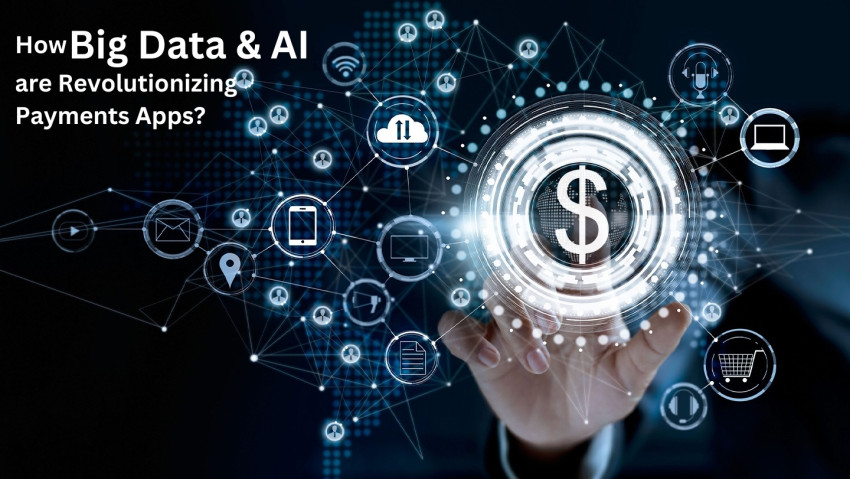
Data is the new gold in this technology-driven world. From e-commerce to retail and real estate to healthcare, every industry uses data to its benefit. The financial sector is no exception – in fact, this sector relies a lot on data for success.
Ewallet app development companies integrate Big Data to understand customer behavior, predict trends, enhance security, and offer personalized services to their customers. For a long time, the financial technology, or fintech industry, relied upon the traditional models of operating their business. Still, a lot has changed in the past few years with the advancement in Big Data and Artificial Intelligence (AI).
Technologies like ewallets, virtual cards, and cashless payments now use Big Data and Artificial Intelligence to make more informed decisions. In this post, we’ll discuss the role of Big Data and AI in the finance sector and how it will revolutionize payment apps.
How Is Big Data Transforming the Finance Sector?
Let’s start with an example. Finance recovers and optimizes their returns on investments. Retail, however, has some benefits of reaching out to customers more easily with the help of customer behavior tracking. But when this sector combines with finance, targeting the right customers becomes difficult in less time and money. Big Data development services enable this sector by providing aggregated information about customer behavior and helps businesses make better predictions.
Banks, insurance companies, and loan providers have been making use of this technology for a long time. You must have noticed that whenever you search for some loan or insurance policy, you start seeing related ads and get calls from various providers. Previously, it was believed that these companies sell data to each other, and it might have been true a few years back. But today, these companies have advanced data analytics that capture customer behavior and intentions. And this method has proven to be quite effective for businesses as well as customers.
Not just this, big data has a significant role to play in redefining payment apps – especially e-wallets and virtual cards. But before we jump into it, let’s understand these terms.
What is an E-wallet App?
E-wallets, mobile wallets, or digital wallets are a platform that allows users to make monetary transactions directly from their phone, without needing any physical cards or access to bank accounts. The most significant advantage here is that users do not have to use different apps for different bank accounts, as they can use a single app to manage all their performances.
E-wallets allow customers to pay to any UPI account by scanning a code or entering the mobile number/UPI detail. Since their inception, e-wallets have reduced using physical currencies to a great extent.
What is a Virtual Card?
A virtual card is just like your simple credit or debit card, except for that physical card. You can apply where you have your 16-digit card number and an option to scan. You may scan any supporting scanner to make payments, and it’s done. While a physical card is prone to theft and misuse, virtual cards provide enhanced security and convenience, along with other benefits like loyalty points and reward points.
How Are Big Data and AI Transforming Payment Apps?
There are various cases when these innovative technologies help users manage their payment apps and get enhanced security and convenience.
Use Case-1: Predicting customer behavior
If you are an avid shopper of books and use your ewallet/virtual card for buying books, soon you will start getting recommendations and discount offers on books. Or if you usually scan your eWallet/virtual card in a specific store, you’ll notice the same. This is the power of Big Data and AI. These technologies analyze customer behavior and spending patterns to provide such benefits.
Use Case – 2: Reducing card declines
Companies lose 3% of their revenue due to false credit card declines every single year. This amount goes into billions, which is a huge loss for businesses and a huge frustration for users. This mainly happens when the system detects a fraudulent transaction or the spending limit is crossed. However, Big Data and AI may detect the user’s past transactions and may break the transaction anomalies and reduce the chances of card declines.
Use Case – 3: Fraud Detection
Big Data and AI help detect fraud transactions by using a superior algorithm that can differentiate between a normal transaction and a suspicious one. This algorithm uses a large amount of data and thus can prevent hackers from stealing someone’s financial information and misusing it. There are mainly two algorithms used in this process – supervised and unsupervised algorithms.
The supervised algorithm uses labeled data, which means it already has a large dataset of suspicious accounts and prevents any such transaction if made from/to those accounts. On the other hand, the unsupervised algorithm learns from untagged data. Whenever a transaction is made and the data is non-existent but looks suspicious, this algorithm blocks the transaction and informs the individuals.
Conclusion
Big Data and Artificial Intelligence are no new terms and have a huge impact in various industries, but their role in the financial sector is second to none. This is particularly true because this sector requires a high level of security and is very prone to fraud. By making use of these technologies in apps like eWallet and Virtual Cards, businesses do not only make sure the users are safe but also gain added benefits like better customer targeting, less revenue loss, and more spending from customers.
Many companies have already started using these next-gen technologies in their payment apps and are seeing excellent outcomes. So this is the right time when businesses, particularly eWallet App Developers, should consider using them as an advanced feature for their customers. This is mutually beneficial for both – the developers and the mobile payment solution providers – in improving customer satisfaction, gaining more security and luring a larger customer base.
If you want to build a mobile payment application with these innovative features like Big Data Analytics and Artificial, get in touch with us, and let’s turn your app idea into a profitable business.


